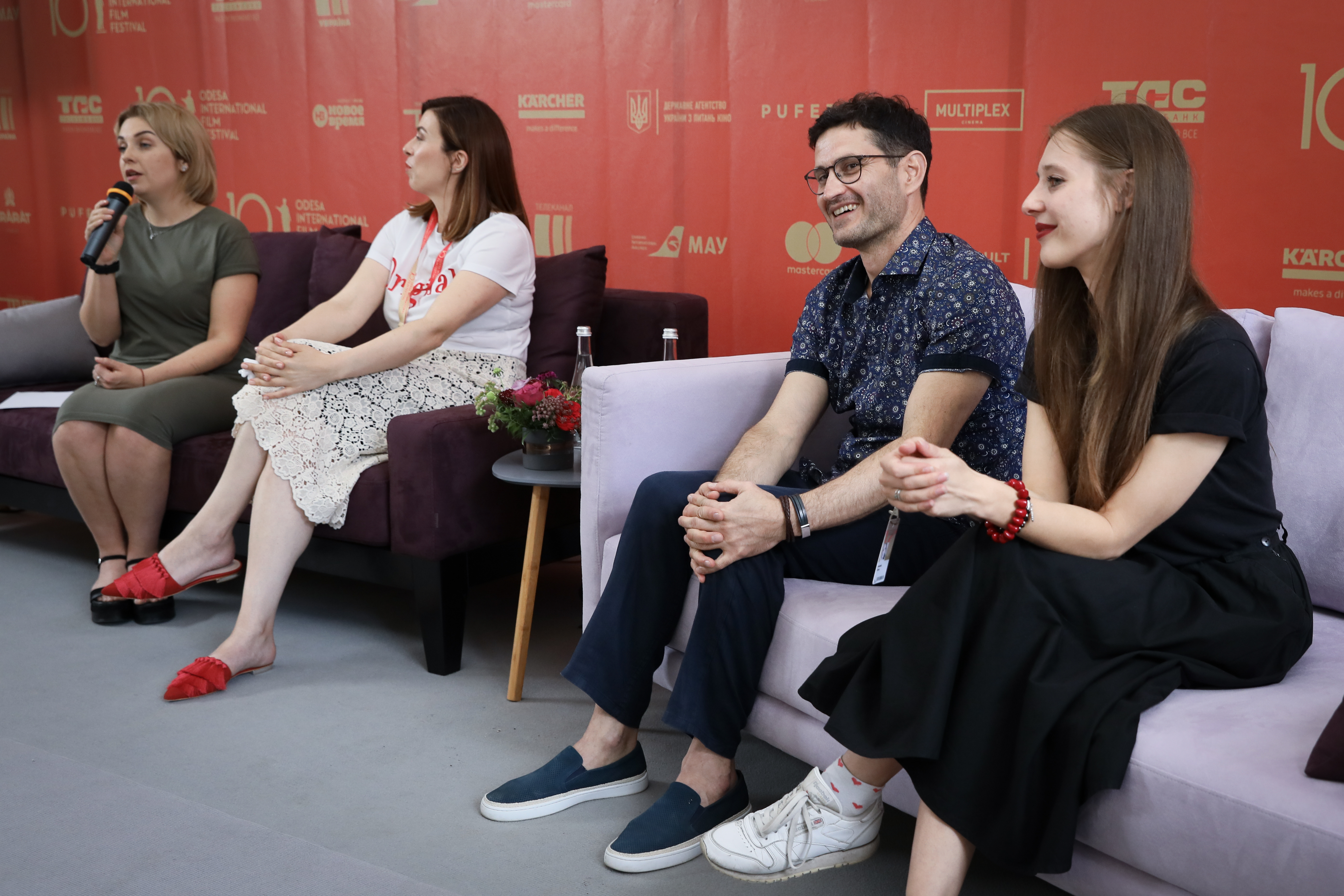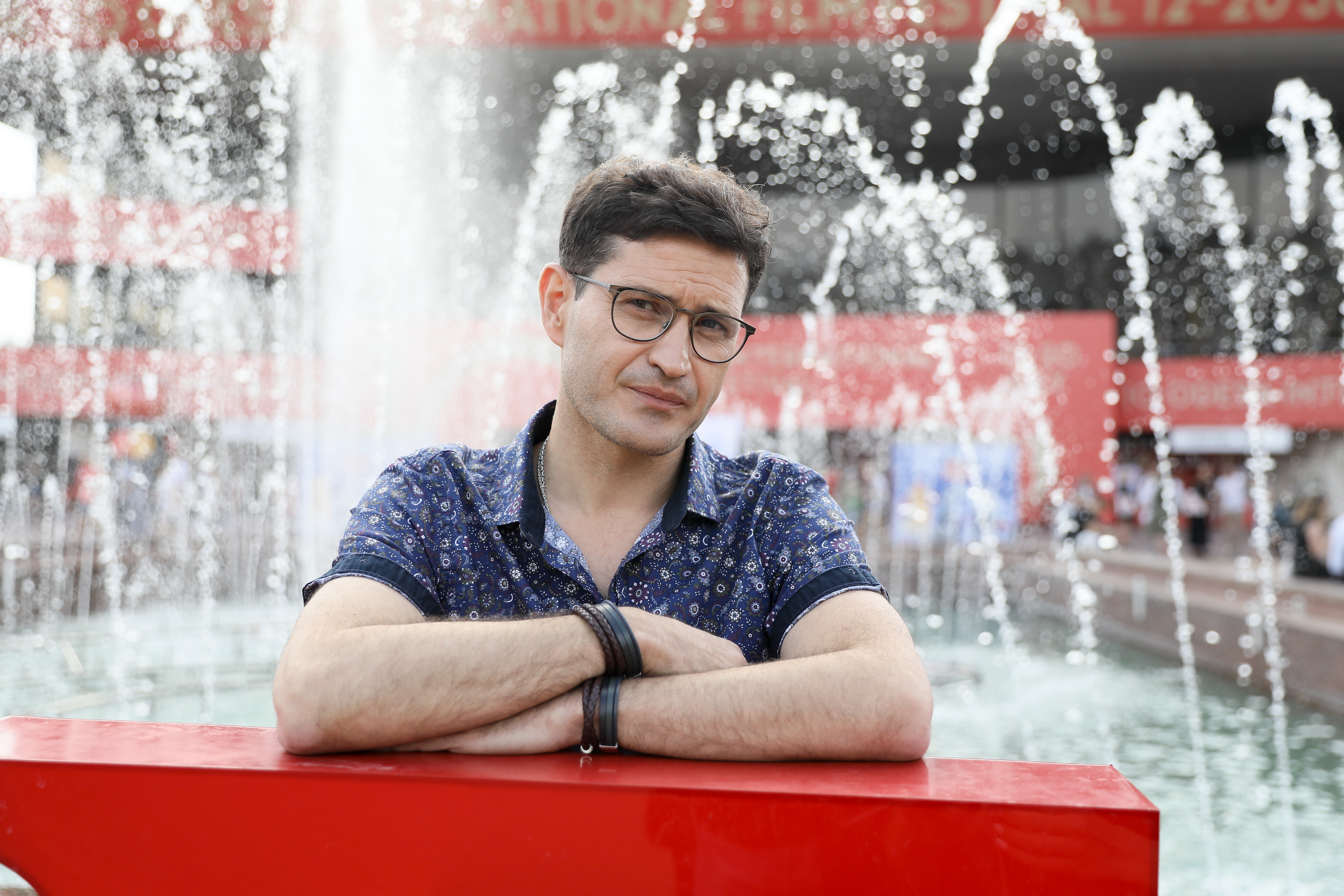ODESA, Ukraine — Having spent five years in a Russian prison, Ukrainian director Oleg Sentsov keeps resisting Kremlin’s authoritarian system. He now co-directs a dystopian film shot in Kyiv from a prison located over 2,600 kilometers away from Ukraine.
Called “Nomery” (Numbers), the film is currently in the post-production phase and is expected to premiere closer to 2020.
Its first teaser has been presented on Sentsov’s 43rd birthday, July 13, at the 10th Odesa International Film Festival.
Sentsov’s co-director is acknowledged Ukrainian filmmaker and actor Akhtem Seitablayev.
“Showing his work is another tool to talk about Oleg not as a criminal but as an artist, who has been unfairly convicted and imprisoned,” Seitablayev told the Kyiv Post.
The upcoming film is based on the dystopian novel which Sentsov wrote in 2011, however, it can’t be more timely than now when the director resists Kremlin’s regime.
The picture shows a society of numbers led by a mysterious Zero, whose strict and absurd rules everyone follows until a rebel, Seven, disobeys and starts a relationship with a number he’s not allowed to be with.
“At first, it’s a world of strange, silly people, who are overall satisfied with everything, until they start asking themselves questions,” Seitablayev says.
Created on the edge of cinematography and theater, “Numbers” was shot with two cameras in one scenery constructed in a film studio in Kyiv.
Sentsov is a Crimean-born director and writer. He was arrested in Crimea in 2014 after Russia invaded and occupied the peninsula. He was later subjected to a sham trial and sentenced to 20 years in prison in the frigid Russian north.
The director went on hunger strike in 2018 demanding that the Kremlin regime releases over 60 Ukrainian political prisoners from jails in Russia and Russian-occupied Crimea. Today there are nearly 100 of them.
Before Sentsov finished his 145-day hunger strike, he became a symbol of fighting for freedom and received broad support from all over the world winning the Sakharov Prize for Freedom of Thought from the European Parliament.
Beginning
The film’s production has been initiated by Ukrainian producer and a friend of Sentsov, Anna Palenchuk around a year ago. The producer has held numerous projects in support of Sentsov since his imprisonment from book publishing to the staging of the “Numbers” play in 2019.
She says that he hesitated about directing it, however, decided to lead the production after the film has been selected for the pitch of the 9th Odesa International Film Festival.
“If not for this festival, this film would not have been made,” Palenchuk said at the teaser presentation on July 13.

A banner with a portrait of Oleg Sentsov is seen as people walk in the Odesa Academic theater of music and comedy to watch a movie during the 9th Odesa International Film Festival in Odesa, on July 16. (Volodymyr Petrov)
Soon after that, the film’s team received almost Hr 10 million from Ukraine’s Ministry of Culture for the production.
“Numbers” has eventually been made as a co-production of Ukraine and Poland having Dariusz Jabłoński, Polish film director and the president of Polish Film Academy, co-producing the picture.
Jabłoński, who has been a long-time supporter of Sentsov, attracted star Polish cinematographer Adam Sikora and editor Jaroslaw Kaminski, famous for such works as “Cold War” and “Ida.”
And the Polish Film Institute provided additional funds of about Hr 10 million for the movie.
But despite all the funding and support, there was something the movie missed: its director was far away from Kyiv and he could be barely involved in the pre-production process – the only, moderated by the prison, way to communicate with Sentsov was via email. That’s when the need for a co-director appeared.
After reading an email with Seitablayev’s vision of a film, Sentsov selected him out of a number of Ukrainian directors. Both born in Crimea, the filmmakers met at Odesa film festival in 2012 but they have never worked together before.
Seitablayev says he has always loved the theater of absurd, the style in which “Numbers” is written, so after reading the play he thought he knew how to film it.
“Apparently, he (Sentsov) loved my vision,” Seitablayev says.
Directing via emails
After Seitablayev stepped in as a co-director to embody Sentsov’s guidelines, the filmmakers sent each other dozens of emails creating a common concept for the future movie.
Seitablayev says that he was impressed that Sentsov had a clear understanding of exactly what he wanted to see.
“If I didn’t know he was in prison, I would have thought he’s writing from, let’s say, Simferopol (Crimea’s capital),” Seitablayev says.
According to Seitablayev, the co-directors often happened to send each other the same suggestions simultaneously. However, they did have emotional, strong discussions about some of the movie elements, such as an actor for the role of Zero. But Seitablayev says that the final decision was always up to Sentsov.
“It’s my attempt to express the gratitude to him for what he’s doing, that he’s returning our Crimea,” Seitablayev said.

The producer of the “Numbers” film Anna Palenchuk (L), co-director Akhtem Seitablayev and casting director Anastasia Chorna (R) talk to the media at the teaser presentation at 10th Odesa International Film Festival on July 13, 2019. (Oleg Petrasiuk)
Although the film’s team put much effort into having Sentsov as involved as possible – he approved decorations, costumes, makeup and even color editing, the process of selecting actors and actresses was especially difficult.
Sentsov couldn’t see the applicants acting – he only received their photographs, as well as thorough descriptions of the auditions from Seitablayev and casting director Anastasia Chorna.
Chorna says that they wrote long emails with all the possible details from the way an actor looks and talks to his zodiac sign.
“I think that the email censors in prison can hold workshops on how to select an actor for a role,” Chorna said at the presentation. “They had a very serious educational material.”
Having been already challengable, the process of directing was even more difficult, as not all the emails sent have been received.
Seitablayev believes that it was a way for those who hold Sentsov in prison to demonstrate their power over him.
However, Sentsov’s aspiration to create the film turned out to be stronger: despite all the obstacles, “Numbers” is getting closer to the finish line aiming to reach big screens all over the world.
Campaign
Sentsov worked on the play’s adaptation for the screen when he was already in prison, which is why the script has references to his recent experience – imprisonment and hunger strike.
Seitabayev says that Sentsov has never mentioned using “Numbers” as a way to put pressure on Russia. However, the co-director believes that everything connected to Sentsov now has political context no matter what’s the intention and says that their team is not afraid of it because it’s a way to express support.

Akhtem Seitablayev, Ukrainian filmmaker and the co-director of the “Numbers” film talks to the Kyiv Post at the 10th Odesa International Film Festival on July 15, 2019. (Oleg Petrasiuk)
“The man is in prison for the sixth year because he is one of the brightest personalities, who openly challenged (Russia) and was ready to sacrifice his life,” Seitablayev says.
The team of “Numbers” wants to hold a campaign following its premiere and distribution.
Seitablayev says that both he and Sentsov hope that the picture will premiere at an international film festival of the highest level.
But Seitablayev also says that they want to have a broad international distribution reaching as many viewers as it’s possible. He says that the more spectators will see it, the more powerful will be the synergy that might help to release Oleg.
“We want to remind the whole world, authorities, (Vladimir) Putin and all of us that there’s an unlawfully imprisoned man who found the highest and most noble way to not feel imprisoned by creating and at least virtually being free,” Seitablayev says.
